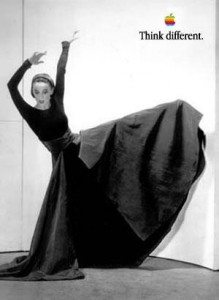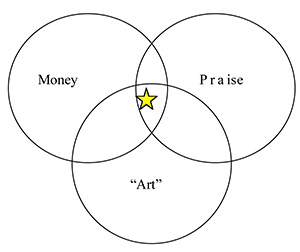4dancers is adding a new column to the mix–Making Dances. Lauren Wernecke will be writing this series and today she is here with use to give readers an introduction this subject and some of her thoughts on the matter…

by Lauren Wernecke
Well, hi there.
I’m so honored to be joining the fabulous crew at 4dancers. Making Dances is a unique writing experience for me, because, generally speaking, I tend to write about things I know a lot about. Like the Achilles tendon. And cheese.
I mean, what do I really know about making dances? On a good day, not much.
There’s a saying that “the more you think you know, the less you know, you know?”
I don’t necessarily think that this is always true, but in the case of choreography, part of the process of making a dance is about figuring out how to make it. Coming up with ideas is easy. It’s the implementation of said ideas that makes our jobs hard…
…and in the end, no matter how many comp classes or choreographic devices you implement, the rules on how to make a dance are individual to each dancer and each dance.
My goal in writing Making Dances is not simply to tell you how to make a dance. This is not Choreography 101. It’s a biased view inside one person’s creative process. However, my hope is that hearing my experiences in making dances will give you leave to reflect on your own creative process and to, in turn, articulate what makes YOU tick.
So, enough about me…
Instead of jumping right in to the meat and potatoes of the column, I thought it might be interesting to talk about what motivates us as artists. Why do we make work? How do we determine whether or not we are “successful”?
By my calculation, an artist’s success is largely determined by three things:
Money
Praise
And the art itself (I’ll explain what I mean by this later)
 I freely admit that money and praise are huge motivators in my work. Artists that don’t admit that they are at least partially motivated by money and praise are lying. I’d love to think that we could make simply art for the sake of art all of the time. I’ve known many choreographers who purport that they don’t care what the audience thinks, or that they don’t care if they get paid… that the satisfaction of making a dance regardless of anything else is what really matters. Well, they’re right. It SHOULD be all that matters, but that’s not a sustainable model. We kind of have to care about money and praise. When all is said and done, and the curtain closes, we’re not just artists…. we’re also people. We have bills. We have student loans. And, let’s be honest, we care what people think about us.
I freely admit that money and praise are huge motivators in my work. Artists that don’t admit that they are at least partially motivated by money and praise are lying. I’d love to think that we could make simply art for the sake of art all of the time. I’ve known many choreographers who purport that they don’t care what the audience thinks, or that they don’t care if they get paid… that the satisfaction of making a dance regardless of anything else is what really matters. Well, they’re right. It SHOULD be all that matters, but that’s not a sustainable model. We kind of have to care about money and praise. When all is said and done, and the curtain closes, we’re not just artists…. we’re also people. We have bills. We have student loans. And, let’s be honest, we care what people think about us.
But can we make dances that are purely motivated by money and praise? Sure we can. It’s called Dancing With the Stars. The professional ballroom dancers who choreograph the dances on the show are primarily concerned with providing entertainment for the audience and judges, which translate to praise from the judges and votes from fans, and ratings (i.e. money). They are freaking successful.
Earlier in my career, I was choreographing for a local musical theatre company. The cast was mostly youth, and the performances were always packed. On a smaller scale, I was (freaking) successful too. After all, making a decent living making dances is all any choreographer can ask for.
The question should perhaps not be whether or not we can make dances based on money and praise, but whether we should. Success isn’t always just about good reviews, packed houses, and a paycheck at the end. What was lacking for me during that time was the feeling that I had made something really meaningful. Real success has to be felt in your gut.
Remember at the beginning when I mentioned that there were three aspects of success? A work that is motivated purely by money or praise is empty on the inside. There has to be some sort of pulp inside of it that comes from a place of pure artistry.
Money
Art
Praise
I like to think of success as a Venn diagram, and success (here shown by a shiny yellow star) is what happens when the big three motivators intersect harmoniously.
The recent passing of Steve Jobs allowed me to reflect a bit more about this art – money – praise paradigm. At several periods throughout his career, Steve Jobs and his little Apple company were the renegades, the misfits, the avant garde artists of the technology world who created what they wanted to with little regard for the mainstream or their overall financial success. The result? Perhaps one of the most unique and powerful companies in the world, not to mention one of the richest.
We see examples of this in our own field. Isadora Duncan led the pack in her mutinous dissent from ballet. Ruth St. Denis, Ted Shawn, and Martha Graham are some of our greatest role models and laid the foundation for contemporary choreographers. I have never met a choreographer who claims to be motivated by financial gain or care deeply about what critics said about them. They make and make the art they wanted to make.
Yet, there’s something inside of truly great artistry that resonates and let’s the audience in, and when that happens, more people pay for tickets. That’s the pulp. The juicy morsel on the inside. THAT is success.
How do YOU define success in your work?
Contributor Lauren Warnecke is a Chicago-based dance artist, educator and writer. She trained at Judith Svalander School of Ballet and Barat Conservatory of Dance before earning a BA in Dance at Columbia College Chicago. In 2009, Lauren completed her MS in Kinesiology at the University of Illinois at Chicago. She is an adjunct instructor for the Department of Kinesiology at UIC, the Performing Arts Coordinator at the Menomonee Club for Boys and Girls, a member of the Cecchetti Council of America, and Neurotransmitter to Synapse Arts Collective (read: too many jobs).
Lauren created and maintains Art Intercepts as a platform for dance that is informed, inventive, and evidence-based. In addition to writing at 4dancers, Lauren is a columnist at Dance Advantage, specializing in dance injuries and prevention, dancer wellness, and evidence-based teaching practices. She also enjoys her freelance work as a grant writer and production manager and likes to grow strawberries, bake scones, and dig in the dirt.





